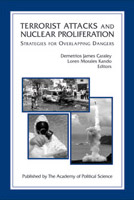
2007 · 296 pages
ISBN13: 978-1-884853-06-7
ISBN10: 1-884853-06-4
Paperback: $27.50 (APS Members: $22.00)
| Order: | Paperback |
This book examines strategies to combat terrorism and counter nuclear proliferation, and discusses related moral, ethical, and constitutional consequences. It is a sequel to two volumes previously published by the Academy of Political Science: September 11, Terrorist Attacks, and U.S. Foreign Policy and American Hegemony: Preventive War, Iraq, and Imposing Democracy. The purpose of this latest book is to bring within one volume essays that examine the continued threat of terrorist attacks, the proliferation of nuclear capacity, and, worst of all, the possibility of a nuclear weapon coming into the hands of and being used by these terrorists. There are also chapters that look at the ethical, moral, and constitutional repercussions that have come from fighting these threats.
PART I: INTRODUCTION
Overview
Walter LaFeber
Why the Doctrine of American Hegemony Cannot Be Sustained
Robert Jervis
PART II: TERRORIST ATTACKS
The Rationality of Radical Islam
Quintan Wiktorowicz and Karl Kaltenthaler
Deterring Nonstate WMD Attacks
David P. Auerswald
The Fight Against Terrorist Financing
Anne L. Clunan
PART III: NUCLEAR PROLIFERATION
After Saddam: Regional Insecurity, Weapons of Mass Destruction, and Proliferation Pressures in Postwar Iraq
Andrew Flibbert
The Debate over Nuclear North Korea
Victor D. Cha and David C. Kang
Iran's Nuclear Program: Motivations, Options, Consequences
Jim Walsh
PART IV: MORAL, ETHICAL, AND CONSTITUTIONAL REPERCUSSIONS
Killing Civilians Intentionally: Double Effect, Reprisal, and Necessity in the Middle East
Michael L. Gross
Tragic Choices in the War on Terrorism: Should We Try to Regulate and Control Torture?
Jerome Slater
The Detention and Trial of Enemy Combatants: A Drama in Three Branches
Michael C. Dorf
PART V: CONCLUSIONS
Do Counterproliferation and Counterterrorism Go Together?
Daniel Byman
Join the Academy of Political Science and automatically receive Political Science Quarterly.
Academy Forum | The 2024 Presidential and Congressional Elections: Small Wave, Seismic Effects
WEBINAR
Jimmy Carter's Legacy
Jimmy Carter's Public Policy Ex-Presidency
John Whiteclay Chambers II
Publishing since 1886, PSQ is the most widely read and accessible scholarly journal with distinguished contributors such as: Lisa Anderson, Robert A. Dahl, Samuel P. Huntington, Robert Jervis, Joseph S. Nye, Jr., Theda Skocpol, Woodrow Wilson
view additional issuesArticles | Book reviews
The Academy of Political Science, promotes objective, scholarly analyses of political, social, and economic issues. Through its conferences and publications APS provides analysis and insight into both domestic and foreign policy issues.
With neither an ideological nor a partisan bias, PSQ looks at facts and analyzes data objectively to help readers understand what is really going on in national and world affairs.